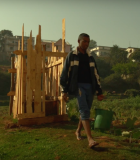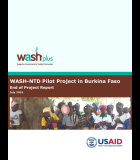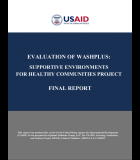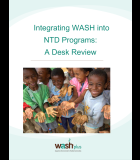Water, Sanitation, and Hygiene Plus – Mali (WASHplus-Mali)
The WASHplus Supportive Environments for Healthy Communities Project was a multi-year Cooperative Agreement (2010-2016) that supported healthy households and communities by creating and delivering interventions that lead to significant improvements in access, practices, and health outcomes related to water supply, sanitation, and hygiene (WASH) and household air pollution (HAP). The project was led by FHI 360 in partnership with CARE and Winrock International, and funded through USAID’s Bureau for Global Health. WASHplus was also joined by a diverse set of NGO, university, and private sector resource partners. WASHplus included seven separate country programs: Bangladesh, Benin, Kenya, Madagascar, Mali, Uganda, and Zambia.
Activity Description
WASHplus in Mali
Poor WASH behaviors lead to more than bouts of diarrhea; they compromise human potential. Evidence linking open defecation to stunted growth as well as the effects of tropical enteropathy, a subclinical condition caused by the repeated ingestion of human and animal feces, on children’s nutritional status are beginning to emerge. In the face of this growing evidence base, practitioners are looking for new ways to integrate WASH into nutrition programming.
In northern Mali WASHplus is implementing a two-year WASH and nutrition project in 18 communes in three districts of the Mopti Region. The project aims to improve the nutritional status of women of reproductive age and their children (especially those under 2 years of age) through the adoption of complementary WASH and nutrition behaviors (fixed point defecation; hand washing with soap; safe water treatment, handling, and storage; exclusive breastfeeding; and improved infant feeding practices). To do so, WASHplus targets barriers on both the supply and demand side that hinder access to improved sanitation and healthy nutrition practices.
WASHplus also provides training to community health workers (known as relais) already in place in the target neighborhoods on screening and referral of malnourished children, infant and young child feeding practices, and how to negotiate small doable actions related to healthy WASH/nutrition practices. Relais organize cooking demonstrations in communities triggered using CLTS. Complementary feeding practices promote to mothers emphasize the importance of hand washing with soap and the use of treated water to wash and prepare complementary foods.
As in other countries, WASHplus triggers change in sanitation practices through the community-led total sanitation (CLTS) approach with a “plus” component that includes construction and correct use of a hand washing facility outside the latrine. In Mali the plus component also signifies supply-side interventions to develop low-cost latrine models appropriate to the unique environmental conditions in each district coupled with training community-based masons to build robust latrines using local materials. To complement the CLTS-driven approach in rural areas, WASHplus is beginning a sanitation marketing activity to engage materials suppliers and local entrepreneurs to market a line of aspirational sanitation products in Mopti’s urban areas.
Expected Outcomes
- Reduce diarrheal disease and acute respiratory infections, the top two killers of children under five years of age globally
- Integrate WASH into existing education, HIV/AIDS, maternal and child health, NTD and nutrition programs
- Build strong in-country partnerships to increase impact.
- Promote innovation in the WASH and HAP sectors.
Actual Outcomes
- WASHplus-developed intervention strategies and project management tools.
- Drafted baseline protocol.
- Established or revitalized WASH committees in villages.
- Continue CLTS triggering in remaining villages.
- Nutrition demonstrations
- Support community volunteers to screen infants for malnutrition
- Developed Small doable actions for WASH/nutrition.





